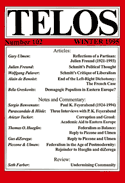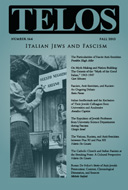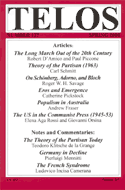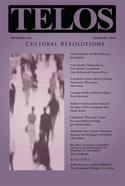By Matthias Küntzel · Monday, November 25, 2013 HAMBURG, November 24, 2013—During the night of November 24, 2013, it came to this: The five permanent members of the Security Council and Germany signed an interim agreement that accepts the plutonium facility at Arak and approves Iran’s continued uranium enrichment. “This deal appears to provide the world’s leading sponsor of terrorism with billions of dollars in exchange for cosmetic concessions,” criticized Senator Mark Kirk (R-Illinois).
Continue reading →
By Johanna K. Schenner · Tuesday, October 8, 2013 As an occasional feature on TELOSscope, we highlight a past Telos article whose critical insights continue to illuminate our thinking and challenge our assumptions. Today, Johanna Schenner looks at Alain de Benoist’s “The End of the Left-Right Dichotomy: The French Case,” from Telos 102 (Winter 1995).
 In his article “The End of the Left-Right Dichotomy: The French Case,” Alain de Benoist points to the gradual disappearance of traditional political ideologies in both socialist and conservative parties. In fact, Sofres Polls support this statement: in March 1981, 33% of the population viewed this delineation as outdated; in February 1986, 45% of the population shared this view; in March 1988, this proportion reached a new record level of 48%; and eventually in November 1989, more than half of the French population deemed this ideological antagonism as obsolete (73). In his article “The End of the Left-Right Dichotomy: The French Case,” Alain de Benoist points to the gradual disappearance of traditional political ideologies in both socialist and conservative parties. In fact, Sofres Polls support this statement: in March 1981, 33% of the population viewed this delineation as outdated; in February 1986, 45% of the population shared this view; in March 1988, this proportion reached a new record level of 48%; and eventually in November 1989, more than half of the French population deemed this ideological antagonism as obsolete (73).
Continue reading →
By Franklin Hugh Adler · Monday, September 23, 2013 Telos 164 (Summer 2013) is now available for purchase in our store.
 When we examine European anti-Semitism during the 1930s, and especially the Shoah, the case of Germany looms so large that the Nazi regime immediately appears as the paradigmatic form of fascism and the manifold policies directed against European Jewry during the 1930s little more than German racial policy writ large. Without in any way trivializing or, worse, relativizing in an ethical sense the German case, one might nevertheless suggest that it occupies too much conceptual space and occludes a more precise comparative understanding of other European cases where anti-Semitic policies had been autonomously generated, relatively independent of direct Nazi pressure. In this sense, decentering the German case might be a necessary first step toward a less encumbered perspective on what happened elsewhere. When we examine European anti-Semitism during the 1930s, and especially the Shoah, the case of Germany looms so large that the Nazi regime immediately appears as the paradigmatic form of fascism and the manifold policies directed against European Jewry during the 1930s little more than German racial policy writ large. Without in any way trivializing or, worse, relativizing in an ethical sense the German case, one might nevertheless suggest that it occupies too much conceptual space and occludes a more precise comparative understanding of other European cases where anti-Semitic policies had been autonomously generated, relatively independent of direct Nazi pressure. In this sense, decentering the German case might be a necessary first step toward a less encumbered perspective on what happened elsewhere.
Continue reading →
By Johannes Grow · Tuesday, August 27, 2013 As an occasional feature on TELOSscope, we highlight a past Telos article whose critical insights continue to illuminate our thinking and challenge our assumptions. Today, Johannes Grow looks at Pierluigi Mennitti’s “Germany in Decline,” from Telos 127 (Spring 2004).
 In “Germany in Decline,” from Telos 127 (Spring 2004), Pierluigi Mennitti addresses Berlin’s inability to enact “true” reforms, which has subsequently led to a decline in its economic, geopolitical, and cultural influence. Through an examination of a contemporaneous Der Spiegel article, Mennitti demonstrates the reluctance of the Federal Republic to accept such thoroughgoing Reformen, which would allow it to crawl out of its then apparent decline and to depend far less on the economic strategies propounded during the so-called “economic miracle” of the post-1949 era. Although it would seem to have been premature to write off Germany as the “economic engine” in Europe, his article nevertheless offers several accurate points. For example, Mennitti asserts that Germany In “Germany in Decline,” from Telos 127 (Spring 2004), Pierluigi Mennitti addresses Berlin’s inability to enact “true” reforms, which has subsequently led to a decline in its economic, geopolitical, and cultural influence. Through an examination of a contemporaneous Der Spiegel article, Mennitti demonstrates the reluctance of the Federal Republic to accept such thoroughgoing Reformen, which would allow it to crawl out of its then apparent decline and to depend far less on the economic strategies propounded during the so-called “economic miracle” of the post-1949 era. Although it would seem to have been premature to write off Germany as the “economic engine” in Europe, his article nevertheless offers several accurate points. For example, Mennitti asserts that Germany
Continue reading →
By Jens-Martin Eriksen · Thursday, July 18, 2013 Jens-Martin Eriksen’s “Culturalism: When the Culture becomes Political Ideology” appears in Telos 163 (Summer 2013). Read the full version online at the Telos Online website, or purchase a print copy of the issue in our store. Eriksen and Stjernfelt’s The Democratic Contradictions of Multiculturalism is also available here.
 The political critique of modernity has gained momentum in Europe in recent years. It is a diverse movement, encompassing populist nationalist and national-conservative parties in Western Europe, a fascistoid Christian-nationalist revival—and on the opposite side: Islamism and the people they instrumentalize, the multiculturalists. They all agree that politics should focus primarily on culture and religion, and all other fields of operation depend on these aspects being stable and undisturbed and not influenced by other trends in society. The dogma that individuals from different groups should not mix is widely accepted and a de facto apartheid is more or less implemented in Western Europe by the civil society. The physical segregation in the cities and in public schools is a fact. The political power play is for the moment over signs and political symbols—e.g., the referendum in Switzerland about the prohibition of minarets, the ban on religions symbols in public schools in France, and other initiatives. The Left seems dazed and confused in this battle and unable to calibrate how to meet the challenge. The political critique of modernity has gained momentum in Europe in recent years. It is a diverse movement, encompassing populist nationalist and national-conservative parties in Western Europe, a fascistoid Christian-nationalist revival—and on the opposite side: Islamism and the people they instrumentalize, the multiculturalists. They all agree that politics should focus primarily on culture and religion, and all other fields of operation depend on these aspects being stable and undisturbed and not influenced by other trends in society. The dogma that individuals from different groups should not mix is widely accepted and a de facto apartheid is more or less implemented in Western Europe by the civil society. The physical segregation in the cities and in public schools is a fact. The political power play is for the moment over signs and political symbols—e.g., the referendum in Switzerland about the prohibition of minarets, the ban on religions symbols in public schools in France, and other initiatives. The Left seems dazed and confused in this battle and unable to calibrate how to meet the challenge.
Continue reading →
By Michael Marder · Friday, March 29, 2013 Today concludes the series of five blog entries aimed at understanding the current political crisis in the European Union through a Schmittian lens. (For the previous posts, see part 1, part 2, part 3, and part 4.) In this post, Michael Marder asks what it would take for the EU to overcome the crisis. The answer, he argues, is nothing less than the EU constituting itself anew, by way of contesting the meaning of the European political subjectivity.
Toward a New Self-Constitution of Europe?
What remains, within the framework the European Union, is the constitution in a relative sense, dissolved “into a multitude of individual, formally equivalent constitutional laws.”[1] We face an expression without anything to express, devoid if not of meaning then of a connection to the sources of meaningfulness. The relegation of constitutional unity to the background and its substitution with constitutional details suits well that institutional arrangement where unity does not actually exist, that is, one where it is not bound to the texture of political existence. The multitude of EU laws is groundless in a different sense from the groundlessness of the absolute concept of the constitution, which is rooted in actual existence and, therefore, self-grounded: “Every existing political unity has its value and its ‘right to existence’ not in the rightness or usefulness of norms, but rather in its existence.”[2] Assuming that this necessary precondition for constitutionality has not been set in place, the main challenge Europe is facing, one that is more fundamental than solving the financial and political crises it is embroiled in, is to attain its political existence, to constitute itself.
Continue reading →
|
|
 In his article
In his article  When we examine European anti-Semitism during the 1930s, and especially the Shoah, the case of Germany looms so large that the Nazi regime immediately appears as the paradigmatic form of fascism and the manifold policies directed against European Jewry during the 1930s little more than German racial policy writ large. Without in any way trivializing or, worse, relativizing in an ethical sense the German case, one might nevertheless suggest that it occupies too much conceptual space and occludes a more precise comparative understanding of other European cases where anti-Semitic policies had been autonomously generated, relatively independent of direct Nazi pressure. In this sense, decentering the German case might be a necessary first step toward a less encumbered perspective on what happened elsewhere.
When we examine European anti-Semitism during the 1930s, and especially the Shoah, the case of Germany looms so large that the Nazi regime immediately appears as the paradigmatic form of fascism and the manifold policies directed against European Jewry during the 1930s little more than German racial policy writ large. Without in any way trivializing or, worse, relativizing in an ethical sense the German case, one might nevertheless suggest that it occupies too much conceptual space and occludes a more precise comparative understanding of other European cases where anti-Semitic policies had been autonomously generated, relatively independent of direct Nazi pressure. In this sense, decentering the German case might be a necessary first step toward a less encumbered perspective on what happened elsewhere.  In “Germany in Decline,” from Telos 127 (Spring 2004), Pierluigi Mennitti addresses Berlin’s inability to enact “true” reforms, which has subsequently led to a decline in its economic, geopolitical, and cultural influence. Through an examination of a contemporaneous Der Spiegel article, Mennitti demonstrates the reluctance of the Federal Republic to accept such thoroughgoing Reformen, which would allow it to crawl out of its then apparent decline and to depend far less on the economic strategies propounded during the so-called “economic miracle” of the post-1949 era. Although it would seem to have been premature to write off Germany as the “economic engine” in Europe, his article nevertheless offers several accurate points. For example, Mennitti asserts that Germany
In “Germany in Decline,” from Telos 127 (Spring 2004), Pierluigi Mennitti addresses Berlin’s inability to enact “true” reforms, which has subsequently led to a decline in its economic, geopolitical, and cultural influence. Through an examination of a contemporaneous Der Spiegel article, Mennitti demonstrates the reluctance of the Federal Republic to accept such thoroughgoing Reformen, which would allow it to crawl out of its then apparent decline and to depend far less on the economic strategies propounded during the so-called “economic miracle” of the post-1949 era. Although it would seem to have been premature to write off Germany as the “economic engine” in Europe, his article nevertheless offers several accurate points. For example, Mennitti asserts that Germany  The political critique of modernity has gained momentum in Europe in recent years. It is a diverse movement, encompassing populist nationalist and national-conservative parties in Western Europe, a fascistoid Christian-nationalist revival—and on the opposite side: Islamism and the people they instrumentalize, the multiculturalists. They all agree that politics should focus primarily on culture and religion, and all other fields of operation depend on these aspects being stable and undisturbed and not influenced by other trends in society. The dogma that individuals from different groups should not mix is widely accepted and a de facto apartheid is more or less implemented in Western Europe by the civil society. The physical segregation in the cities and in public schools is a fact. The political power play is for the moment over signs and political symbols—e.g., the referendum in Switzerland about the prohibition of minarets, the ban on religions symbols in public schools in France, and other initiatives. The Left seems dazed and confused in this battle and unable to calibrate how to meet the challenge.
The political critique of modernity has gained momentum in Europe in recent years. It is a diverse movement, encompassing populist nationalist and national-conservative parties in Western Europe, a fascistoid Christian-nationalist revival—and on the opposite side: Islamism and the people they instrumentalize, the multiculturalists. They all agree that politics should focus primarily on culture and religion, and all other fields of operation depend on these aspects being stable and undisturbed and not influenced by other trends in society. The dogma that individuals from different groups should not mix is widely accepted and a de facto apartheid is more or less implemented in Western Europe by the civil society. The physical segregation in the cities and in public schools is a fact. The political power play is for the moment over signs and political symbols—e.g., the referendum in Switzerland about the prohibition of minarets, the ban on religions symbols in public schools in France, and other initiatives. The Left seems dazed and confused in this battle and unable to calibrate how to meet the challenge. 

